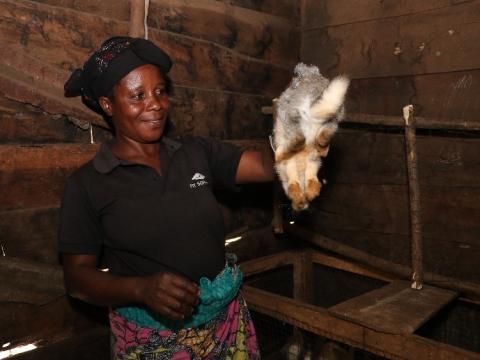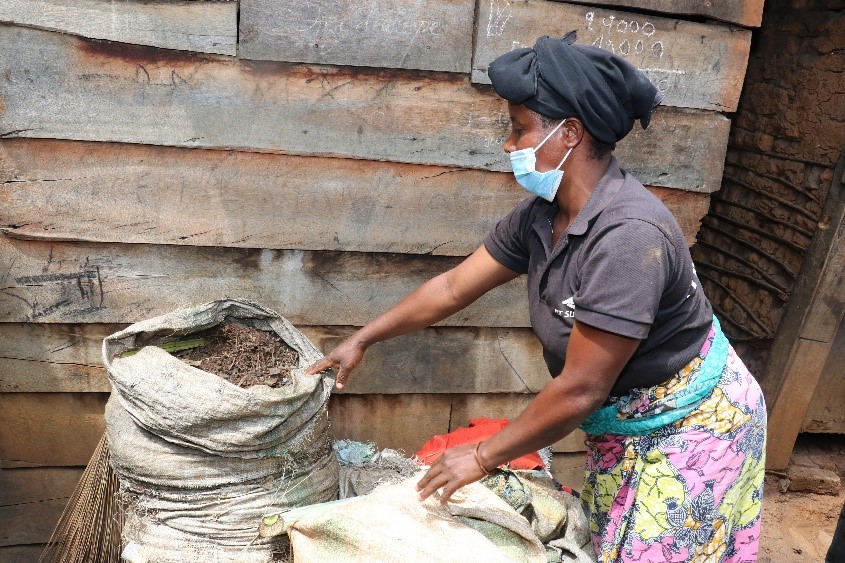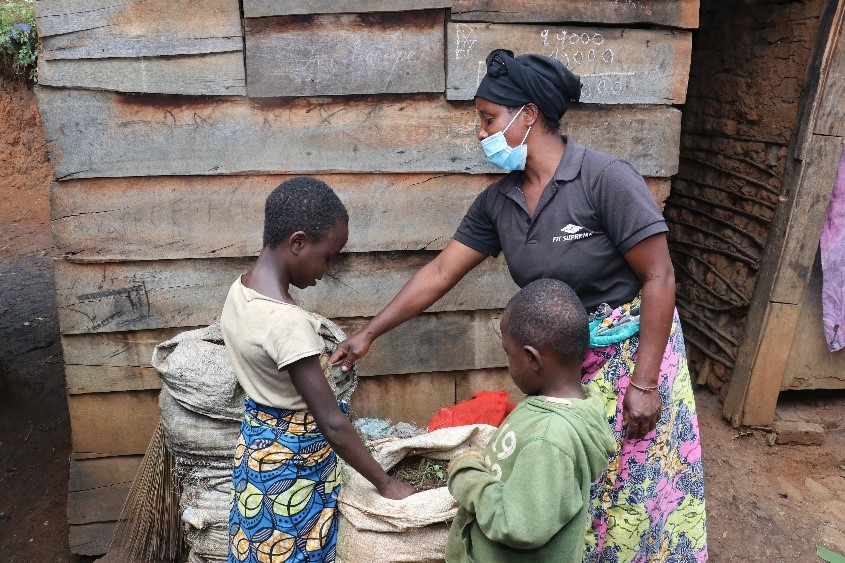Rebecca, the happy rabbit breeder

By Vedella Rutaha - SBCC and Senior Media Officer
-
Under the shade of her hutch, Rebecca Kalwira's smile shows her joy when she comes to enquire about the development of the young rabbits born three weeks ago. For one year, she has been experimenting with rabbit breeding; an experience that was not widely available in Kabumbiro village, which is situated 24km from Kalehe centre in DRC's South Kivu province, where Rebecca has lived for 12 years now since fleeing Nyamutwe because of attacks by rebels in eastern DRC.
Rebecca is forty-four years old, and a mother of six children including three daughters. She admits that, unlike other types of breeding, raising or eating rabbits was rare. For her, the experience is really new. "I had never raised rabbits in my life. It is certainly the strength of Food Security Project's support and the benefits to be gained that motivate me", she recognises.
Although animal protein is necessary for the growth and well-being of the body, eating meat in this village is not for everyone. Pork and goat meat is only available on the weekly market day.
For one year and five months, as a neighbourhood mother, Rebecca learned of the importance of animal protein in the body of children and pregnant or nursing mothers through her mentor, Marie Masumbuko, a mother leader who was benefiting from the lessons in the Care Group, implemented by the Food Security Project (FSP-Enyanya) funded by USAID from October 2016 to September 2023.
In addition to lessons on health and nutrition, Rebecca also learned how to keep a rabbit farm. "Now, eating meat is part of my household's diet", she says with a smile.
Rebecca is one of the few neighbourhood mothers who received two rabbit genitors from FSP-Enyanya. Her breeding is becoming more and more successful; at the present stage, she has 15 rabbits.
"I had to build myself another three-chamber cage with available materials in order to clear and ventilate the animals in the old overcrowded cage", she says, before confirming, "I have already sold several rabbits that have helped me solve some of my household needs. The rest, I eat with my family." In the meantime, she is working on raising awareness among women to keep rabbits on their farms in order to strengthen their resilience to the food crisis.

As a neighbourhood mother, Rebecca organises visits to her hutch for those who are very interested. More than a dozen women have come to take advantage of her advice, while others come individually to visit out of curiosity. Among them, three women have already received free rabbits to get started. "To motivate them, I gave the ones who had made cages. This was the guarantee required from me to facilitate a good accompaniment of the beneficiaries", reveals Rebecca, explaining her approach very seriously.
On the other hand, the happiness of Rebecca, devoted and generous, is that of having solved the problem of fertiliser for her permagarden thanks to the manure of her small livestock. "I discovered that the droppings are the real organic fertiliser, more efficient than the ones from other animals. That's why I decided to keep them every time I clean my cages", she says.
Rebecca confirms that she puts part of the droppings in her permagarden and another part in her field, which is not far from her house. More than thirty children benefit from this breeding through the consumption of vegetables and rabbit meat.

And to inspire the younger generation to become breeders, Rebecca involves her husband and children to take care of the rabbits. "My husband never stops helping me to grow this business, and I have noticed that my children are accustomed and courageous to feeding the animals and cleaning the cages", she proudly confides.
Since March 2019, the FSP-Enyanya Project has launched the distribution of rabbits in the health zone of Kalehe. The objective is food diversification, access to animal protein and improving the financial situation in the households of the participants. A total of 4,348 rabbits have already been distributed in the zone to 764 mother leaders and 1,028 neighbourhood mothers